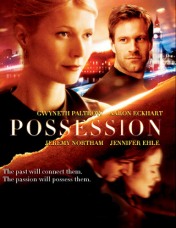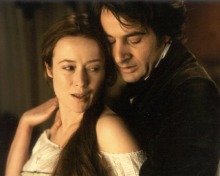|
Possession
|
| |
 |
USA, 2002. Rated PG-13. 102 minutes.
Cast:
Gwyneth Paltrow, Jeremy Northam, Jennifer Ehle, Aaron Eckhart, Lena Headey,
Holly Aird, Toby Stephens, Trevor Eve, Tom Hickey, Georgia Mackenzie,
Tom Hollander
Writers: David Henry Hwang, Laura Jones & Neil LaBute, based on
the novel Possession--A Romance, by A.S. Byatt
Music: Gabriel Yared
Cinematographer: Jean-Yves Escoffier
Producers: Barry Levinson, Paula Weinstein
Director: Neil LaBute
LINKS
|
 frequent
criticism of the A.S. Byatt novel from which Possession, the underwhelming
new film from director Neil LaBute, is adapted is that at five hundred pages
it is about one hundred and fifty pages too long--a wordy book about words,
too arcane to garner popular appeal. Yet the novel's erudition did not prevent
it from moving at the pace of a thriller. Byatt's exquisite extrapolation of
the mechanics of a literary Victorian love affair juxtaposed with the mechanics
of contemporary literary research won both critical and popular acclaim. But
how to adapt for film a book that was more than the sum of its parts, a literary
page-turner following two pairs of characters, a century apart, each inching
towards romantic communion?
frequent
criticism of the A.S. Byatt novel from which Possession, the underwhelming
new film from director Neil LaBute, is adapted is that at five hundred pages
it is about one hundred and fifty pages too long--a wordy book about words,
too arcane to garner popular appeal. Yet the novel's erudition did not prevent
it from moving at the pace of a thriller. Byatt's exquisite extrapolation of
the mechanics of a literary Victorian love affair juxtaposed with the mechanics
of contemporary literary research won both critical and popular acclaim. But
how to adapt for film a book that was more than the sum of its parts, a literary
page-turner following two pairs of characters, a century apart, each inching
towards romantic communion?
Whilst researching Victorian poet Randolph Henry Ash (Jeremy Northam), Roland
Mitchell (Aaron Eckhart) accidentally discovers a draft of letter by Ash that
may have been intended for 'fairy poetess' Christabel La Motte (Jennifer Ehle).
Joining forces with La Motte scholar Maud Bailey (Gwynneth Paltrow), they uncover
a love affair between the two Victorian writers, previously unsuspected by the
legion scholars that catalog and parse the minutiae of each writer's life. One
step ahead of rival Ash devotees, Roland and Maud piece together the chronology
and substance of the affair, realizing that their discovery will turn the established
interpretations of Ash and La Motte's work upside down. Flashbacks show us Ash
and La Motte as they tentatively forge their illicit relationship, first by
letter, then in person in London, Yorkshire, and France.
Initially distrusting each other, Roland and Maud unwittingly mirror prejudices
inherited from their historical subjects as the film suggests several parallels
between the two pairs of protagonists. The misogynist Ash and proto-feminist
La Motte each have to cede intellectual ground to pursue their love; similarly,
Roland and Maud must set aside their preconceptions to pursue the truth.  The
contemporary pursuit of the literary and literal truth echoes Ash and La Motte's
romantic pursuit of each other, while all four are troubled by their responsibilities--the
contemporaries to academic convention, the Victorians to the convention of domestic
faithfulness. Neil LaBute's direction is smooth as he pans between the Victorian
and the contemporary storylines, and Gabriel Yared's (The English Patient,
The Talented Mr. Ripley) restrained
soundtrack is free as ever of obvious emotional cues.
The
contemporary pursuit of the literary and literal truth echoes Ash and La Motte's
romantic pursuit of each other, while all four are troubled by their responsibilities--the
contemporaries to academic convention, the Victorians to the convention of domestic
faithfulness. Neil LaBute's direction is smooth as he pans between the Victorian
and the contemporary storylines, and Gabriel Yared's (The English Patient,
The Talented Mr. Ripley) restrained
soundtrack is free as ever of obvious emotional cues.
Yet something is missing. In two of his earlier films, In the Company of
Men and Our Friends and Neighbors, LaBute examined the nature of
human relations with uncomfortable accuracy. In contrast, this screenplay (co-adapted
with David Henry Hwang and Laura Jones) fails to consistently deliver dialogue
with his customary sharp verisimilitude, and often does little more than allude
to the motivations and personalities of the characters. While retaining the
book's essential narrative, LaBute has truncated the time spent on the La Motte/Ash
story. Cursory characterizations of Ash and La Motte, defined by their circumstances
rather than their personalities, result. This is unfortunate, as Ash and La
Motte's lives and motivations are far more interesting than those of Roland
and Maud, who are dull in comparison. Ash, quite the Renaissance man, married
young to a frigid but devoted helpmeet, and skeptical of La Motte's Spiritualist
tendencies, is a character worthy of further screen time. The character of La
Motte, a Pre-Raphaelite poetess, co-habiting with an increasingly clingy companion,
could equally have been more deeply portrayed to greater overall effect.
As Roland and Maud follow in Ash and La Motte's footsteps, reciting to each
other the correspondence they unearth, the unconvincing Eckhart and Paltrow
barely register the excitement that would surely be experienced by historians
so devoted to their subjects. The movie doesn't even tell us why Roland and
Maud find Ash and La Motte sufficiently fascinating to make careers out of studying
them. A generous assessment of La Bute's adaptation would suggest that, instead
of taking his usual caustic approach to modern relationships, he has opted for
a more subtle tack. In contrasting the richness of the lives and interests of
the Victorians with the blandly post-modern Roland and Maud, there is an implication
that living life vicariously is no match for the real thing. "We're so modern,"
laments the wan Paltrow at one point, making a mockery of the movie's misleading
tag line: "The past will connect them. The passion will possess them." More
often than not, her delivery is insipid and simply disinterested. Paltrow's
vapid capitulation to Eckhart's half-hearted overtures contrasts poorly with
Ehle's strikingly assertive La Motte, determined to meet Ash on equal terms.
A braver approach to this adaptation would have leaned more heavily on the
period drama at the expense of the modern sleuthing, and given the relationships
the emotional substance that the romantic elements needed to convince. Perhaps
the world has had enough of slowly paced costume drama? The BBC's hugely successful
Pride and Prejudice miniseries (also starring Ehle) suggests not, and
either a longer film or a mini-series would have proved a better format to do
justice to Byatt's Possession. Despite such rich source material, this
adaptation, running at just 102 minutes, has sacrificed the romance of the story
at the altar of dramatic expediency.
Review
© September 2002 by AboutFilm.Com and the author.
Images © 2002 USA Films. All Rights Reserved.

 The
contemporary pursuit of the literary and literal truth echoes Ash and La Motte's
romantic pursuit of each other, while all four are troubled by their responsibilities--the
contemporaries to academic convention, the Victorians to the convention of domestic
faithfulness. Neil LaBute's direction is smooth as he pans between the Victorian
and the contemporary storylines, and Gabriel Yared's (The English Patient,
The
contemporary pursuit of the literary and literal truth echoes Ash and La Motte's
romantic pursuit of each other, while all four are troubled by their responsibilities--the
contemporaries to academic convention, the Victorians to the convention of domestic
faithfulness. Neil LaBute's direction is smooth as he pans between the Victorian
and the contemporary storylines, and Gabriel Yared's (The English Patient,
